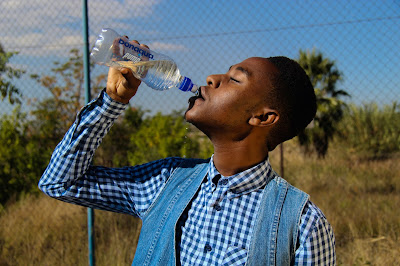7 Health Benefits of Drinking Sufficient Water
1. Helps maximize physical fitness.
2. It has a significant impact on energy levels and brain function.
The brain is greatly affected by the state of hydration. According to studies, even slight dehydration, such as a 1-3% weight loss, can damage many aspects of brain function. In a study of young women, researchers found the fact that fluid loss from 1.4-inch exercise impairs both mood and concentration. It also increased the frequency of headaches.
Many members of this same research team conducted a similar study in younger men. They found that water loss of 1.6% was detrimental to working memory, and increased fear and anxiety.
1-3% water loss is
equivalent to about 1.5 to 4.5 pounds (0.5-2 kg) of weight loss for a 150-pound
(68 kg) person. This can easily happen during exercise or during high fever, as
well as through normal daily activities.
Many other studies of
subjects ranging from children to the elderly show that mild dehydration can impair
mood, memory, and brain performance.
Mild dehydration (1 to 3% water loss) results in decreased energy levels, impaired mood, and can significantly impair memory and brain performance.
3. May help prevent and treat headaches.
Dehydration can cause headaches and migraines in some individuals. Headaches are one of the most common symptoms of dehydration, according to a study. For example, a study of 393 people found that 40% of participants experienced headaches due to dehydration.
In addition, some studies have shown that it may help relieve headaches in people who frequently experience water-drinking headaches. A study of 102 men found that drinking an additional 50.7 ounces (1.5 liters) of water per day significantly increased the migraine star life quality scale, a migraine symptom scoring system. It was improved to. Plus, 47% of men who drank more water reported an improvement in headache, whereas only 25% of men in the control group reported this effect.
However, not all
studies agree, and researchers have found that due to the lack of high-quality
studies, how increased water content improves headache symptoms and reduces the
frequency of headaches. We have come to the conclusion that more research is needed
to see if it helps.
Summary
Drinking water can help reduce headaches and headache symptoms. However, higher levels of research are needed to see these potential benefits.
4. Can't Help Relieve Constipation
Constipation is a
common problem characterized by rare bowel movements and difficulty passing
flights. Increasing fluid intake as part of a treatment protocol is often
recommended, and there is some evidence to support this. Low water consumption
is thought to be a risk factor for constipation in both adolescents and the
elderly.
Increasing fluids may
reduce constipation. Mineral water can be a particularly beneficial drink for
people with constipation. Studies show that mineral water rich in magnesium and
sodium improves consistency with the frequency of excretion in people with
constipation.
Summary
Drinking plenty of
water can help prevent and relieve constipation, especially for people who
generally do not drink enough water.
5. May help in the treatment of kidney stones.
Urolithiasis is a
painful mass of mineral determination that forms in the urinary system. The
most common form is kidney stones that form in the kidneys. There is limited
evidence that fluid intake helps prevent recurrence in people who have
previously developed kidney stones. Excessive fluid intake increases the amount
of urine produced through the kidneys. Because this dilutes the concentration
of minerals they are less likely to crystallize and form clumps. Water may also
help prevent the early formation of stones, but studies are needed to confirm
this.
Summary
Increased fluid intake appears to reduce the risk of kidney stone formation.
6. Helps Prevent Hangovers
Hangover refers to
the unpleasant symptoms experienced after drinking alcohol. Because alcohol is
a diuretic, you lose more water than you consume. This can lead to dehydration.
The main cause of a hangover is not dehydration, but it can cause symptoms such
as thirst, fatigue, headache, and dry mouth. A good way to reduce a hangover is
to drink a glass of water between drinks and at least one large glass of water
before bedtime.
Summary
Hangovers are
partially caused by dehydration, and drinking water can help relieve some of
the main symptoms of hangovers.
9. Helps Lose Weight
Drinking lots of
water can help you lose weight. This is because water can increase satiety and
increase your metabolic rate. Some evidence suggests that increasing your water
intake may slightly increase your metabolism, promote weight loss, and increase
the number of calories you burn each day.
A 2013 study of 50
overweight young women found that drinking 16.9 ounces (500 mL) of water three
times a day before meals and 16.9 ounces (500 mL) of water for 8 weeks
significantly reduced weight and body fat, out of comparison with previous
measurements of the study . Timing is also important. Drinking water 30 minutes
before meals is most effective. You can feel more full as you consume less
calories. In one study, dieters who drank 16.9 ounces (0.5 liters) of water
before meals lost more than 44% more weight for 12 weeks than those who did not
drink water before meals.
Credited images: pexels.com
